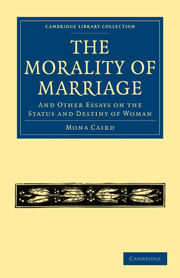PART I - MOTHERHOOD UNDER CONDITIONS OF DEPENDENCE
Published online by Cambridge University Press: 16 May 2011
Summary
“Before being a wife or mother, one is a human being, and neither motherly nor wifely destination can overbalance or replace the human, but must become its means, not end. As above the poet, the painter, or the hero, so above the mother does the human being rise pre-eminent.”
—Jean Paul Richter.“If it were not for the children, I would take a dose of chloroform to-morrow!”
These are the words of the wife of a well-to-do tradesman, who, after twelve years of marriage, finds life a burden too heavy to be borne. After much theory, a little fact, hot from the lips of a simple-minded woman, without theories, but with plenty of experience, comes with a force that is somewhat startling.
The woman recognised gratefully her worldly prosperity; there was nothing fretful about her complaints. One pitied her most when she made some unconscious admission, let fall some pathetic, patient little word, which revealed how little she asked and how much she was ready to endure. Her husband is a “good fellow,” with an uncertain temper. He is capricious and imprudent, and the success of the business depends on his wife, who works at it unremittingly, sending her husband and children away for a holiday now and then, while she remains to look after the customers. The wife's industry has made the business nourish, though her husband frequently declares his intention of selling it, in spite of her remonstrance, and in this contest he has finally prevailed, having control of the purse-strings.
- Type
- Chapter
- Information
- The Morality of MarriageAnd Other Essays on the Status and Destiny of Woman, pp. 131 - 149Publisher: Cambridge University PressPrint publication year: 2010First published in: 1897

